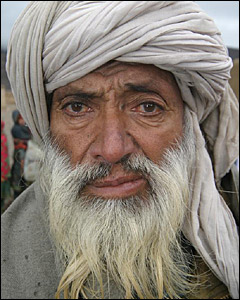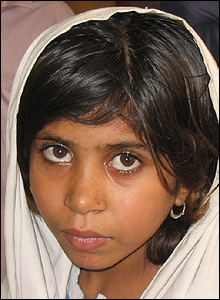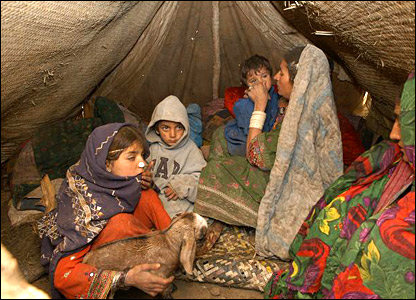 Mohammad Tufail Baloch has twelve children. The oldest one is 26 and the youngest one 6. For generations his tribe has lived at Dera Bugti till trouble came to the area few years ago. Nawab Akbar Bugti had demanded more royalty money for the gas fields and unless given promised trouble for the government. Military government responded in negative and the Nawab chose to fight back.
Mohammad Tufail Baloch has twelve children. The oldest one is 26 and the youngest one 6. For generations his tribe has lived at Dera Bugti till trouble came to the area few years ago. Nawab Akbar Bugti had demanded more royalty money for the gas fields and unless given promised trouble for the government. Military government responded in negative and the Nawab chose to fight back.
Caught in this cross fire were Mohammad Tufail and his family.
No longer able to provide food for his family off his meager income from making and repairing wooden sleeping cots, Tufail decided to leave the area and move to some other parts of the country. He and his family became what have come to be known as internal refugees. After tracking through the hills and mountains of Balochistan and Frontier provinces the family finally reached the banks of Indus River near Attock and set their tents outside the city.
The family crafts of making cots from the wood cut from the open country side and ropes made from the twines has helped it survive. In the last few years his four older children have either gotten married or moved away to the other parts of Punjab in search of jobs. Since like Mohammad Tufail himself, all of his children are totally illiterate their job prospects are very limited.
Now the second part of the story.
 My old college room mate (who shall remain nameless) after a long successful career in international banking decided to return to his ancestral village along the banks of Indus. Other than fowl hunting along the river, his life long passion was to open a school in his village. As a child he had daily traveled several miles with an adult chaperon in order to go to school. His parents being the local landowners were able to do that whereas none of the other parents could afford that luxury for their children. As a result none of his childhood friends from the village went to school. For them the village mosque was the school and Moulvi Sahab the only teacher they ever had. With land donated by his father and from his personal funds my friend has opened up a school for the local students.
My old college room mate (who shall remain nameless) after a long successful career in international banking decided to return to his ancestral village along the banks of Indus. Other than fowl hunting along the river, his life long passion was to open a school in his village. As a child he had daily traveled several miles with an adult chaperon in order to go to school. His parents being the local landowners were able to do that whereas none of the other parents could afford that luxury for their children. As a result none of his childhood friends from the village went to school. For them the village mosque was the school and Moulvi Sahab the only teacher they ever had. With land donated by his father and from his personal funds my friend has opened up a school for the local students.
One day a young 17 years old girl with her three youngest siblings showed up at my friend’s door and asked for his wife. She wanted to enroll her two younger sisters and one brother in the village school but informed that the family would not be able to pay the tuition and instead offered Balochi embroidery as tuition payment that the older girl had done with her own hands.
Now the third part of the story.
 On my every trip to Pakistan I always visit my friend and together we go around Lahore desperately trying to re-live our youths. I have been very pleased with his school project and have been helping him in his endeavor in what ever small way I can. We routinely call each other and exchange our e-mails, some times daily. The first and the second parts of the story were told to me by my old friend. I was deeply touched by the story of Mohammad Tufail Baloch and his family. It reminded me the story of my own family. I had never met my own great grand father but had heard the family stories millions of times that how two centuries ago my own people from Persia tracked through the hills and deserts of Afghanistan, Balochistan and Frontier to reach to the fertile plains of Punjab and Sindh. They were not the worriers riding behind Nadir Shah and Ahmad Shah Abdali. They were just the simple goat and sheep herding nomads searching for a better life for their children, very much like Mohammad Tufail Baloch and his twelve children.
On my every trip to Pakistan I always visit my friend and together we go around Lahore desperately trying to re-live our youths. I have been very pleased with his school project and have been helping him in his endeavor in what ever small way I can. We routinely call each other and exchange our e-mails, some times daily. The first and the second parts of the story were told to me by my old friend. I was deeply touched by the story of Mohammad Tufail Baloch and his family. It reminded me the story of my own family. I had never met my own great grand father but had heard the family stories millions of times that how two centuries ago my own people from Persia tracked through the hills and deserts of Afghanistan, Balochistan and Frontier to reach to the fertile plains of Punjab and Sindh. They were not the worriers riding behind Nadir Shah and Ahmad Shah Abdali. They were just the simple goat and sheep herding nomads searching for a better life for their children, very much like Mohammad Tufail Baloch and his twelve children.
I have since then ‘adoptedâà ¢â€šÂ¬Ã¢â€žÂ¢ Lubna, Hifza and their younger brother Tamim. Lubna has just finished class 6 and secured second place. Hifza has finished class 2 and has stood first by scoring 449 marks out of 500. Tamim has finished class 1. He is not working hard. His position is 6th in his class. Tamim and I have to have a talk.
The author Pervaiz Munir Alvi is Pittsburgh based Civil Engineer by profession. He is a regular commentator and writer at ATP.


















































Much of the Story written by Pervaiz Munir Alvi is Fake, i know this man personally, he lives in New Kahan, Quetta, Though its also a refugee camp for internally dispalced people, but they migrated to afghanistan during the 1973-77 operation, and returned to Pakistan after the fanatic Pakistan Based Thalibans took over kabul. after their return they settled in New Kahan, a place near Quetta Hazar Ganji Sabzi Mundi.
His elder son is kidnapped by Punjabi army and hence he is searching for his lost son at this old age.
Most of the men from this village are either killed or kidnapped by ISI/MI after musharaf started a full fledged army operation in Balochistan.
I request the author to avoid writing fake stories, using real picture, as the world wide web is a small place for such cheap write ups.
Every action counts. Education in itself is more empowering than any other act of charity.
Internal refugees, homeless in their own home. Those eyes of Mohammad Tufail Baloch should haunt everyone of us. Questions, so many questions and so little to answer. Those tears in his eyes, are they from dispair, anger, fatigue or hopelessness. For goodness sake even the Bangledeshi Government is now taking better care of it’s nationals.
You have certainly earned yourself a source of perpetual reward Mr. Pervaiz Munir Alvi.
If you know channels for helping the needy please do contact me at kaleem.afzal@siemens.com
I would be more than glad to furnish any financial help.
Pseudonym ‘Desi Italiana’: This post is not about Balochistan and politics unless one wishes to make it one. In order to understand Balochistan and its problems one has to study its ‘Sardari’ system and the role of international politics. For now, at least for me these subjects are beyond the scope of this post. The person Mohammad Tufail could have been from any place xyz and the story would have been the same. So let us not politicise the topic. Plus the fact that you have made your points on the subjects of your choice should suffice. And about why Pakistan spends large sums on defence. Well it has to do with the neighborhood in which Pakistan is located. Again discussions on those lines will take us off track from the human side of the story. This is a story about three families and their respective aspirations. The human element is the common thread in this story. Glad you were able to enjoy that side of the story as well.
Pervaiz:
Thank you for responding.
“The issues you have raised here are not unique to Balochistan.”
Absolutely- but this post was on Balochistan, and so I referred to that specifically :)
And while I definately agree with you that this inequality of education goes beyond the region of Balochistan, there is something to be said about the fact that Balochistan is at the bottom of the pile with respects to other regions in Pakistan, especially when Balochistan is the theatre of gross human rights violations enacted by the Pakistani government in the name of the “war on terrorism” and “development”. Surely this plays some part in the predicament of the welfare of the people?
“There is no political side to this story. Educating and uplifting the lives of our people is something we all could do with little effort.”
I would like to disagree with this. I don’t think one can dismiss the fact that there is (in my opinion, of course) a political side to the story. Pakistan spends a large amount of its federal budget on defense- not on education. Of course, this manner of expenses (allocating more to defense rather than, say, public policies) isn’t exclusive to military regimes, such as Musharraf’s; the US is a “democracy” in theory, but we are one of the biggest spenders in defense. But I do think there is something to be said about the problems of education, the state’s role in it, and so on.
“Educating and uplifting the lives of our people is something we all could do with little effort.”
I agree with you to a certain extent. We could all- and should- do something about education.
But the people who could do this with “a little effort” are the ones who have the money and time. And those people are far and few. This is what I was saying in my previous comment- the actions of a few caring individuals such as yourself may help people- but not the majority of the people. That is why there needs to be more of an input- both financially, socially, and politically- by the state to provide education and access to it to all citizens. If not, then education will be left in the hands of private individuals/organizations. This leads to the privatization of education and secondly, to limited impact and outreach. It doesn’t extend into the entire society and its members at large.
I hope I am not taking away from the beauty and intention of your post. I was very touched by it. Furthermore, it made me think of the larger picture. But it also made me ponder about where philanthropic actions fit into the grander scheme of things.